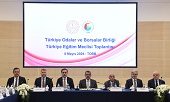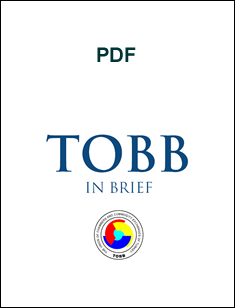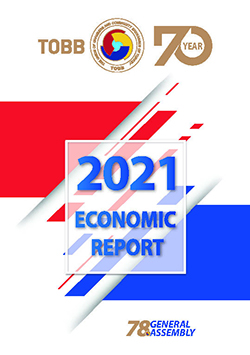New curriculum discussed at the TOBB Education Council with participation of Minister Tekin

08.05.2024 / Ankara
Current issues in the education sector were discussed at the Union of Chambers and Commodity Exchanges of Türkiye (TOBB) Education Council meeting with the participation of Minister of National Education Yusuf Tekin. TOBB Board Member Selçuk Öztürk said that they believe that the new skills-based curriculum will be an important means of change for the country, while Minister Tekin gave information about how and on what grounds they based the new model.
TOBB Türkiye Education Council meeting was held at TOBB Twin Towers in Ankara with the participation of Minister of National Education Yusuf Tekin, TOBB Board Member Selçuk Öztürk, Education Council Chairman Yusuf Ekinci and the council members who are the stakeholders of the sector.
In his speech at the opening of the meeting, TOBB Board Member Selçuk Öztürk pointed out that the main factor determining the level of development of countries is the quality of education and said, “The factors that determine the quality of education are essentially teachers and curriculum. We can think of the curriculum of education programs as the operating system of our schools and institutions. In this sense, our curriculum is a very important instrument that shapes the skills of new generations and prepares them for life in line with current developments.”
- “The curriculum should help raise quality human resources”
Pointing out that the curriculum implemented in schools has an important impact on the training of qualified people needed by sectors operating in different fields, Öztürk said: “We need digital and skill-oriented approaches that prioritize the needs and expectations of the 21st century, where education and training will be handled together. In this sense, the fact that Mr. Minister and his valuable team will enlighten the members of the Türkiye Education Council here is a great pleasure for us, as well as an opportunity for the esteemed representatives of the education community who have given years to the education sector and are among us. Education is the most important field that determines the future of societies.
Therefore, we must be open to continuous improvement and innovation in education. In our country, which has a centralized education system, it is important that private education institutions, whose importance is increasing day by day, closely follow and adapt to the changes made in order to fulfill their duties and responsibilities. The future education system should not only transfer knowledge but also support the personal and social development of students.”
- “We must offer instruments that trigger students’ curiosity”
Selçuk Öztürk emphasized that instead of focusing only on academic achievement in education, it is necessary to create an environment that allows students to discover and develop their individual interests and talents, and underlined that it is necessary to offer instruments that will trigger students’ curiosity and focus on raising students who think critically, question and solve problems. “We should nurture the spirit of entrepreneurship and encourage students who dream and set goals,” Öztürk said.
- Minister of National Education Yusuf Tekin
In his speech, Minister of National Education Yusuf Tekin pointed out that the examples of curricula in the world are based on the capacity to transform acquired knowledge into skills rather than the acquisition of knowledge, and said, “It is very clear that we need to make a change here.”
Minister Tekin shared the following views on the issue:
“International texts report that our achievement indicators are not increasing as rapidly as we would like because the education and training process in Türkiye is not skill-oriented. In these texts, there is also a criticism that our programs are too heavy when compared to the countries in the international rating. I see this as justified. We need to realize that the times when it was difficult to access information, when all the information had to be given to our children at school, are now behind us. Examples from around the world have realized this and have designed the curriculum based on their capacity to transform the knowledge they acquire into skills rather than acquiring knowledge. It is clear that we also need to make a change here. In part, this was the starting point of the upward momentum in PISA-TIMSS scores in recent years. In the March 2018 PISA exam, we worked on this issue for at least two years before the exam. Therefore, this is the main focus of our work on the curriculum at the moment.”
- “We want our children to internalize the values that make us a nation”
On the subject of “values and values education”, which dominates the spirit of the new curricula, Minister Tekin said, “We also attach importance to this issue. In other words, we want our children to internalize our values that make us who we are, that make us a nation, along with international skills.”
Recalling Gazi Mustafa Kemal Atatürk’s statement when the Education Congress convened in 1921, “...I mean a culture that is completely free from foreign ideas that have no relation with our characteristics, from all influences that may come from the East and the West, and that is in line with our nationality and history. Because the full development of our national genius can only be ensured by such a culture.” Tekin continued his words as follows:
“This is the starting point of the third change we made in our programs. In the process of preparing the programs, we gave the answer to the question of what we can and should do as a nation to raise a generation in harmony with our own nature and values. This process should viewed retroactively about 10 years ago. In those years, we discussed these issues and took steps to address them. In June 2023, after I took office, I invited anyone who had preparations on this subject, anyone who wanted to support the preparations in the ministry, to work with us. We said we would announce our program, we were waiting for those who wanted to contribute, we gave dates and we repeated this at the expense of wearing ourselves out.”
- “We envision a gradual transition”
Yusuf Tekin thanked those who contributed to the preparations for the new curriculum.
Reminding that they extended the suspension process of the new curriculum, which started on April 26th, for one more week, Tekin said
“As of Friday, we will complete the process and the education departments and the Board of Education will work in line with the suggestions received, and then we will approve and put it into effect. We envision a gradual transition. We have identified the beginning grades of each education level as the grades where the new curriculum will be implemented. Regarding the intermediate grades, the old process, the old curriculum and the old materials will continue. We have no decisions regarding them.”
- TOBB Türkiye Education Council President Yusuf Ekinci
TOBB Türkiye Education Council President Yusuf Ekinci also commented on the new curriculum draft: “The fact that the new curriculum was created with the aim of diluting the existing curricula is extremely important in terms of deeper learning. In addition, the ‘support’ and ‘enrichment’ sections, which have not been encountered in the curricula so far, have been positively received by the public and have become one of the appreciated elements of the curricula.”
Stating that PISA studies indicate that Turkish is not being taught, Ekinci said, “The issues discussed in the new curriculum, such as the removal of the integral from mathematics, are incidental. The main issue to be emphasized is Turkish language teaching. Turkish education is the basis for all other activities.”
Emphasizing that these issues have been known for years but have not been solved, Ekinci said, “For this reason, it should not be expected that the problems will be solved with known methods, there is a need to find new ways and methods. Although it is important for the Ministry to establish an academy for teacher training, it is not enough. There is a need to organize education faculties according to this curriculum.”
Your message has been sent
Thank you |




